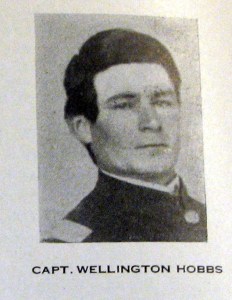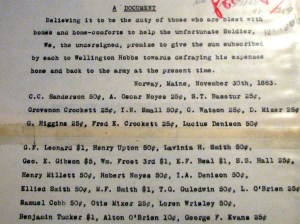NORWAY — The Norway Historical Society has received an original Civil War document that curator Charles Longley says demonstrates the charitable nature of the townspeople.
“It’s an example of how the town has always pulled together over the years,” said Longley.
The two-page, handwritten document (that was later put into type) shows the names of scores of townspeople including still familiar names like Noyes, Crockett, Watson, Frost, Tucker, Beal, Millett and others, who rallied around a young soldier named Wellington Hobbs to raise money — anywhere from 25 cents to $5 — in 1863 to help defray his expenses coming home and getting back to the army during the Civil War.
Longley said Norway residents always have helped each other. He cited the effort put forth by townspeople after the great fire of 1894 wiped out much of the downtown business district and other examples such as helping a mother who had to steal potato seed from a neighbor to feed her children and rallying to keep a local business from closing.
The document was purchased and donated to the Historical Society by an anonymous“long-time friend of the Norway Historical Society,” who wanted to donate it to honor former resident Father Don McAllister, a longtime historian who now resides in New Hampshire, said Historical Society trustee Anita Hamilton.
Wellington, a lieutenant who is listed as a musician in Norway Historical Society records, was killed while on picket duty near Petersburg, Virginia about October 27, 1864, according to his obituary in the Dec. 2, 1864, Oxford Democrat. Longley said picket duty generally meant the solider was guarding the lines. The siege at Petersburg was part of a nearly year-long Union campaign in Virginia that resulted in the abandonment of Petersburg and Richmond in 1865 and General Lee’s surrender at Appomattox Court House in April of 1865.
Historians consider the siege at Petersburg the start of “trench warfare,” that became popular in World War I.
According to his obituary, Hobbs volunteered at age 17 as a member of Company G in the First Maine Regiment and served as a private before coming back to Maine and enlisting later in the 17th Maine in which he was appointed orderly sergeant. He was then commissioned second and first lieutenant. He received his commission as captain only one day after he died at the front.
He was the great grandson of Jeremiah Hobbs, one of six men who first felled trees in the new township back in 1786, said Longley. Wellington Hobbs lived in a home on Main and Greenleaf streets that burned down in the fire of 1894. It was rebuilt and burned down again several years ago.
His obituary noted that Hobbs “had been very active on picket duty – firing himself on the average of 200 rounds per day. Some of his men having been shot, he volunteered out of his turn to go out, to avenge if possible, their death. While in a stooping position to load his piece, a rebel bullet struck between his shoulders, and passing upward, came out through his lower jaw.”
It took more than two months to get his body home to Norway where he was buried with military honors. He was called a “brave boy who volunteered at the first,” by the Oxford Democrat.
“This is a very nice addition to the collection,” said Longley.



Comments are no longer available on this story